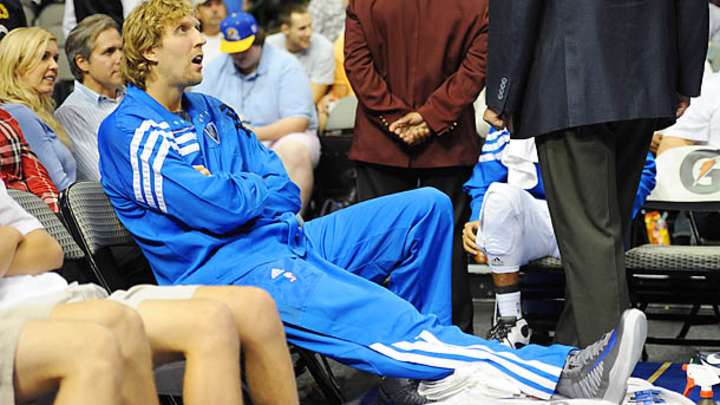Mavericks brace for life without Dirk Nowitzki

Dirk Nowitzki dealt with knee issues before, missing four games at the start of last season. (Jerome Miron/US Presswire)
By Rob Mahoney
The deliberation in Dallas is apparently over. Dirk Nowitzki underwent arthroscopic surgery to address a lingering right knee issue and, as disclosed by the team, is expected to resume on-court activity within six weeks. It's ultimately a wise decision, given the publicly available information on Nowitzki's injury; the fewer regular-season games he misses the better, particularly when the preseason offers only a slight benefit for a player of his standing.
But even after making the right call, those six weeks -- or however long it takes for Nowitzki to assume his previous form -- figure to be excruciating for the Mavericks. Even the sturdiest Dallas teams have been completely reliant on Nowitzki's offensive prowess, and with this year's ramshackle roster still in the feeling-out process, the Mavs could put themselves at a significant disadvantage rather quickly.
Pretty much every set or play action that Dallas runs is based on the notion of Nowitzki as an immediate and credible threat. He dominates the defense's attention when he sets screens, as two points are but a short roll and a jumper away. He distorts opposing defenses when waiting on the weak side by causing the slightest rotational hesitation. He absorbs the opponent's most versatile defender, draws fouls that compound to send Dallas to the line more often and attracts additional defensive pressure. Nowitzki's shooting efficiency from all over the floor empowers all other Mavs to exercise the fullest extent of their offensive games with the least amount of interference possible, and he thus thrived with a supporting cast that would otherwise be considered limited.
That supporting cast may have changed, but the principles at work stay the same. O.J. Mayo, Shawn Marion, Darren Collison, Elton Brand and Chris Kaman are all solid offensive players, but without that primary catalyst to throw an opponent's entire scheme out of whack, Dallas doesn't have much of a shot at scoring stability.
Things get even worse when we stop to consider that Nowitzki was this team's one and only safety net, and thus utterly crucial to the Mavs' early-season acclimation. Dallas is coming off of a two-year stretch in which its team defense provided a sizable margin for error, but the strength of that defense was its chemistry. Even after the departure of center Tyson Chandler, coach Rick Carlisle plugged Brendan Haywood back into the starting lineup last season and saw his team stretch toward a top-10 mark in points allowed per possession. A few additions to the bench didn't undercut the familiarity that the bulk of the roster had with the system already in place, affording Dallas the opportunity to weather Nowitzki's post-lockout struggles.
Yet this season's team, while arguably more impressive in terms of individual defensive ability, doesn't have the luxury of that foundation. Training camp is no substitute for a good year's worth of repetition and a championship gauntlet. This is no longer a process of plugging capable defenders into a proven system, but of orienting an entirely new rotation to the habits and tendencies of one another. Having Brand on the back line should help a bit in cleaning up Dallas' early mistakes, but even his presence doesn't mitigate the countless number of split-second decisions that go into defensive co-dependence. At best, these Mavs will be utterly vulnerable, and stranded without the kind of offensive counterbalance that could move them toward an acceptable margin.
If Dallas has any hope of treading water, it comes from a well-founded confidence in Carlisle. Few coaches -- if any -- are more capable of handling a situation like this one. Carlisle will manipulate lineups, tweak play-calling and help create mismatches to give these Mavs a chance. But even the most adaptable basketball minds are at the mercy of the raw materials available, and this roster -- deep and balanced and fundamentally flawed -- offers only a modest resource.
A few parting thoughts:
• Nowitzki's minutes will have to go somewhere, but based on Carlisle's methods and the nature of this roster, it's unlikely that one single player would receive a bulk of that playing time. Brand will be the most direct beneficiary as he assumes Nowitzki's place in the starting lineup, but that change should create offsetting opportunities elsewhere: Marion will surely step into more playing time as a reserve power forward; Kaman will inherit some of the time that Brand would otherwise have spent at center; Brandan Wright will have more of an opportunity because of the Mavs' lineup flexibility; a versatile wing like rookie second-round pick Jae Crowder could be used across several positions; and small lineups should help out the likes of Vince Carter and Dahntay Jones.
• This should prove to be one hell of an audition for Mayo, who will have all of the scoring responsibility he can handle.
Rockets at Dallas Mavericks">• The Mavs' situation would be far more dire if the Minnesota Timberwolves and Golden State Warriors -- who will compete with Dallas for a playoff spot -- weren't also dealing with injuries to their own star big men. The balance of that misfortune should make the postseason race even more riveting and put pressure on all three teams to correct course as quickly as possible.

Rob Mahoney is an NBA writer dedicated to the minutiae of the game of basketball, its overarching themes and everything in between. He joined the Sports Illustrated staff in 2012.